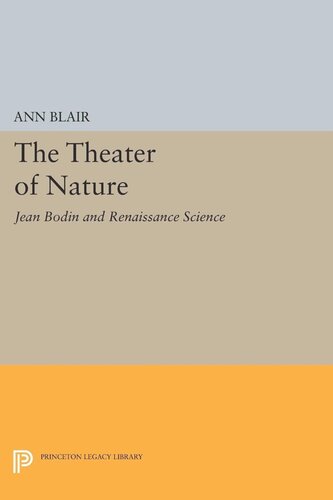

Most ebook files are in PDF format, so you can easily read them using various software such as Foxit Reader or directly on the Google Chrome browser.
Some ebook files are released by publishers in other formats such as .awz, .mobi, .epub, .fb2, etc. You may need to install specific software to read these formats on mobile/PC, such as Calibre.
Please read the tutorial at this link: https://ebookbell.com/faq
We offer FREE conversion to the popular formats you request; however, this may take some time. Therefore, right after payment, please email us, and we will try to provide the service as quickly as possible.
For some exceptional file formats or broken links (if any), please refrain from opening any disputes. Instead, email us first, and we will try to assist within a maximum of 6 hours.
EbookBell Team

4.8
84 reviewsThe Theater of Nature is histoire totale of the last work of the political philosopher Jean Bodin, his Universae naturae theatrum (1596). Through Bodin's work, Ann Blair explores the fascinating and previously little known world of late Renaissance natural philosophy. A study of the text, of its context (through comparisons with different genres of natural philosophy and works entitled "Theater"), and of its reception in the seventeenth century highlights above all the religious motivations, encyclopedic ambitions, and bookish methods characterizing much of late Renaissance science. Amid the religious crisis and the explosion of knowledge in the late sixteenth century, natural philosophy offered grounds for consensus across religious divides and a vast collection of useful and pleasant information, admired for both its order and its variety. The commonplace book provided a versatile tool for gathering and sorting bits of natural knowledge garnered from a wide array of bookish sources and "experience,'' fueling a vigorous cycle of text-based science at least through the mid-seventeenth century. The miscellaneous genre of the problemata into which Bodin's text was adapted attracted more popular audiences until even later. To place the Theatrum in its cultural context is also to reveal more clearly the peculiarities of Bodin's philosophical project in this, its final expression. He combined arguments from reason, experience, and authority to undermine traditional Aristotelian conclusions and proposed instead a natural philosophy based on pious, often biblical, solutions.
Originally published in 1997.
The Princeton Legacy Library uses the latest print-on-demand technology to again make available previously out-of-print books from the distinguished backlist of Princeton University Press. These editions preserve the original texts of these important books while presenting them in durable paperback and hardcover editions. The goal of the Princeton Legacy Library is to vastly increase access to the rich scholarly heritage found in the thousands of books published by Princeton University Press since its founding in 1905.